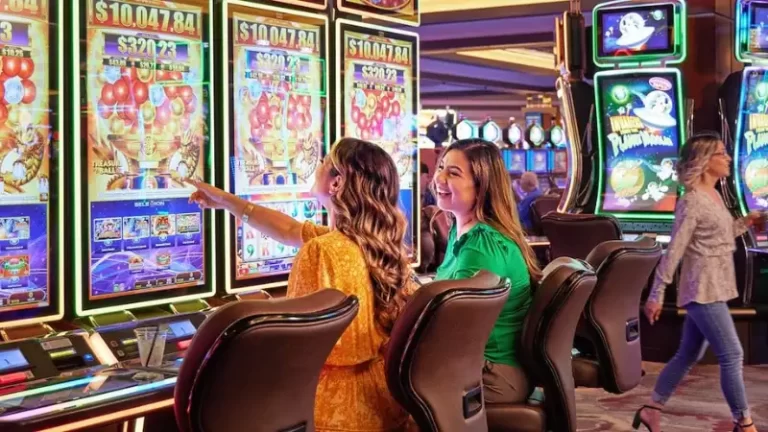
Bonus Psychology
Understanding the mechanics behind bonus features is key to unlocking the allure of slot games, and that’s where Bonus Psychology comes into play. At Slot Pillar, we explore how Bonus Psychology influences player emotions and behaviors around free spins, multipliers, and bonus rounds to make these features more appealing and engaging.
What Is Bonus Psychology?
Bonus Psychology refers to how psychological principles shape the design and presentation of slot bonuses to evoke excitement and satisfaction. It explores how features like free spins, pick-and-win segments, and multipliers are crafted to trigger emotional responses, motivate continued play, and enhance the perception of value.
By examining timing, reward structure, audiovisual feedback, and unpredictability, Bonus Psychology uncovers why players feel good when they hit a bonus and why they keep pursuing those moments.
Key Components of Bonus Psychology
Intermittent Reinforcement
At the core of Bonus Psychology is intermittent reinforcement. Players don’t receive bonus rounds every spin, which makes them feel like small or large bonuses are more meaningful and exciting when they do occur. The unpredictability enhances emotional payoff and encourages more play.
Reward Salience
Bonus features are designed to stand out visually and audibly. Flashy animations, celebratory sounds, and dramatic music signify exciting rewards. This is central to Bonus Psychology, as heightened sensory feedback makes bonus rounds feel more valuable than a regular win of the same size.
Illusion of Achievement
Nature of bonus rounds often involves tasks or triggers, such as landing three scatter symbols or choosing hidden prizes. These actions create the illusion that luck and skill contributed to triggering the bonus, making players feel accomplished. This enhanced sense of achievement is a key aspect of Bonus Psychology.
The Gap Between Customer Perception and True Product Value
Even modest bonus rewards can feel significant thanks to Bonus Psychology, which amplifies their appeal. A small free spin round can deliver satisfaction equivalent to a much larger cash win, especially when accompanied by immersive design and presentation.
Common Bonus Types and Their Psychological Appeal
Free Spins
Free spin rounds are perhaps the most popular and widely used bonus format. Bonus Psychology shows that small clusters of free spins with multiplier potential create thrilling anticipation. They extend play time and pay out without additional player risk, which feels both rewarding and risk-free.
Pick-and-Win Features
Interactive segments requiring players to choose items or symbols add engagement. Bonus Psychology finds that this interactivity builds emotional involvement and heightens excitement, even though outcomes are random.
Multiplier Chains
Bonuses often include multipliers that increase with consecutive wins. Bonus Psychology thrives on the visual gain of seeing amounts multiply, reinforcing the feeling of progress and reward.

Cascading or Re-Spins
When winning symbols trigger re-spins or cascading symbols, it feels like the win is building organically. Bonus Psychology emphasizes that chains of wins create emotional momentum and the feeling of being on a hot streak.
Progressive Jackpots
Large progressive jackpots use Bonus Psychology by showing growing prize amounts on-screen. This creates growing anticipation and a dream-like feeling that any spin could lead to a massive win.
Why Bonus Psychology Works
Dopamine Reward Pathways
Every bonus activation triggers a dopamine response. Bonus Psychology rides on this neurochemical reaction to make players crave and expect more.
Flow State and Engagement
Bonus rounds often lead players into a state of flow—fully immersed, focused, and oblivious to time. Bonus Psychology relies on this immersive state to build deeper engagement and longer sessions.
Sunk Cost Bias
Once players invest time and spins to reach a bonus, they feel compelled to play more, believing they’re on the verge of something big. Bonus Psychology uses this tendency to sustain momentum.
Social Proof and Narrative Hooks
Some bonus formats, like multi-level progressions or tournament features, tap into competitiveness or narrative engagement. Seeing others advancing or nearing a big bonus can motivate people to play more, an insight drawn from Bonus Psychology.
Incorporating Bonus Psychology in Design
Timing and Frequency
Game designers balance bonus frequency with size. Bonus Psychology shows that irregular but well-timed bonuses keep players excited without letting them become mundane.
Sensory Feedback
Visual and audio elements are calibrated to boost impact. Bonus Psychology emphasizes sound layering—rising chords, cymbal crashes, and voiceovers—during bonus triggers to maximize emotional effect.
Progressive Reveal Techniques
Slow reveals—like cards flipping or meters rising—heighten suspense. According to Bonus Psychology, this drawn-out reward process leads to happier reactions and anticipation.
Dynamic Bonus Mechanics
Adaptive bonuses that change based on player behavior or game state feel more personalized and supportive. This use of Bonus Psychology enhances player engagement by creating a sense of game responsiveness.
Potential Downsides of Bonus Psychology
Overstimulating Features
When bonuses trigger too frequently, their effect diminishes. Designing around Bonus Psychology requires balance so bonuses remain special and exciting.
The Danger of Customer Assumptions Not Aligning with Deliverables
If bonus outcomes are disappointing, players may feel cheated. Maintaining player trust means ensuring bonus frequency, likelihood, and rewards match expectations shaped by Bonus Psychology.
Ethical Design Considerations
Because Bonus Psychology can influence player emotions profoundly, it’s important that games include responsible gambling features like session reminders or spend limits to prevent excessive play.
How to Use Bonus Psychology as a Player
Manage Expectations
Understand that bonuses are random events intentionally designed to feel rewarding. This insight from Bonus Psychology helps players avoid emotional over-involvement.
Set Clear Limits
Use deposit or time limits, and treat bonus features as supplemental rewards rather than income sources. This approach aligns with Bonus Psychology without losing control.
Appreciate the Experience
Recognize the design behind bonus rounds—Bonus Psychology is not manipulation but a technique used to enhance entertainment. Enjoy the presentation, but keep perspective on randomness and RTP.
Future Trends in Bonus Psychology
AI-Personalized Bonuses
Future bonus systems may adapt based on player actions. Bonus Psychology integration with AI could mean personalized trigger rates and tailored themes that suit individual players.
Social Bonus Features
Social slots allow players to share bonus wins or cooperative progress. Bonus Psychology research suggests communal gaming boosts emotional response and retention.
Real-Time Adaptive Design
Some developers experiment with real-time balancing where bonus triggers adapt to recent gameplay. Bonus Psychology highlights that dynamic environments can sustain engagement better than fixed structures.
Integrated Responsible Gaming
Combining Bonus Psychology with responsible tools—such as pop-ups during long bonus streaks—can help players stay aware of their behavior while still feeling rewarded.
Measuring the Impact of Bonus Psychology
Analytical Metrics
Developers track bonus activation frequency, session length, bet behavior, and churn rates to fine-tune features. Bonus Psychology principles guide adjustments based on what emotionally connects with players.
User Feedback Loops
Surveys and qualitative feedback provide insight into how bonus rounds feel. Bonus Psychology validation ensures features feel rewarding without misleading players.
A/B Testing Approaches
Teams test different soundtrack intensities, reveal speeds, or animation styles. Metrics like engagement and return play inform Bonus Psychology-based decisions.
Final Thoughts
Bonus Psychology offers deep insight into why bonus rounds are central to slot game engagement and enjoyment. By combining sensory feedback, intermittent reward patterns, anticipation building, and illusions of achievement, bonuses feel powerful and addictive. Understanding these mechanics helps players approach slots with clarity and awareness.
For game developers and operators, mastering Bonus Psychology can guide the creation of slots that are both exciting and safe. At Slot Pillar, we encourage thoughtful use of these techniques to create engaging gaming experiences while protecting player welfare. If you’re curious about bonus mechanics, responsible gaming approaches, or new industry trends, keep following Slot Pillar for the latest insights.



